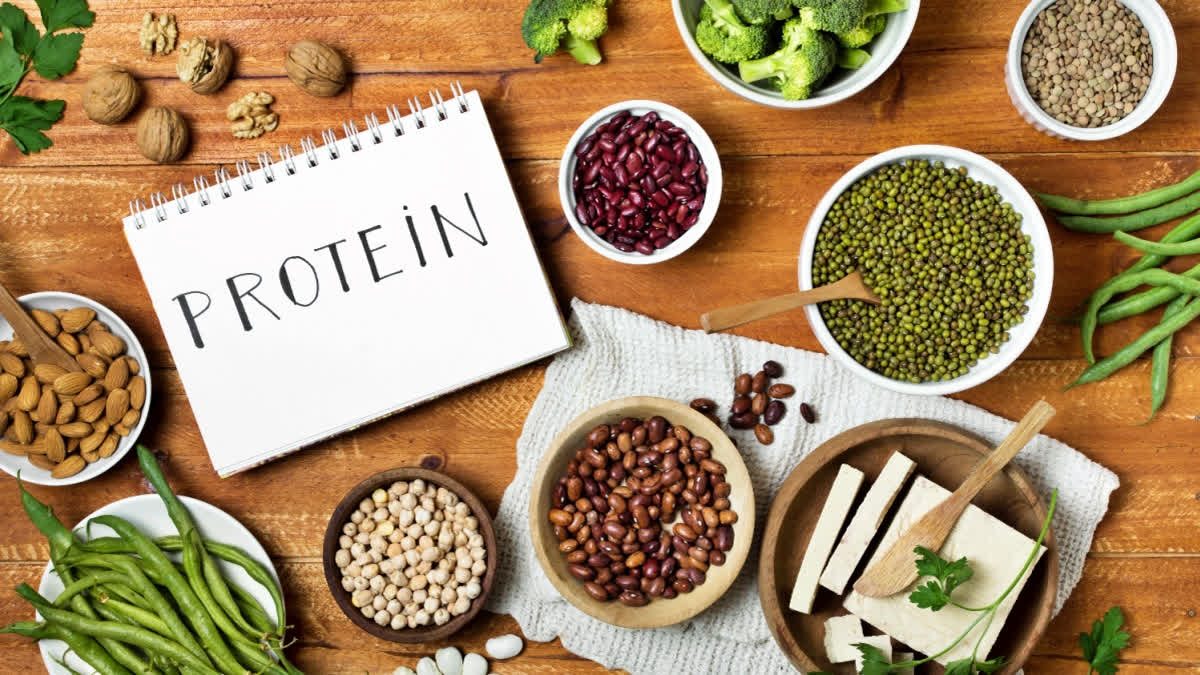Vegetarians often struggle to get enough protein because many traditional protein sources, like meat and fish are off the table. While there are plenty of plant-based options, they’re not always as protein-packed or easy to find, and some don’t provide all the essential amino acids your body needs. This can leave vegetarians at a disadvantage. The key is knowing where to find protein and combining different plant-based foods to ensure you’re getting enough for your body to thrive. With a little planning and knowledge, vegetarians can easily meet their protein requirements.
Why Is Protein Important Even If You Don't Exercise?
"Every cell in your body (skin, hair, nails, and organs) depends on protein to function properly. It helps repair tissues, produce enzymes and hormones, support immune health and maintain overall energy levels. Even if you don’t exercise, your body constantly breaks down and rebuilds proteins to keep you healthy," says Dr Ridhima Khamesra, Clinical Dietician.
Protein is made up of amino acids, which the body uses for a variety of functions. While some amino acids are made by the body, nine are considered essential and must be obtained through food. A well-rounded vegetarian diet can provide these essential amino acids, especially when combining complementary protein sources.
The Recommended Dietary Allowance (RDA) for protein is 0.8 grams per kilogram of body weight. For example, a 70 kg adult needs about 56 grams of protein per day. Athletes, pregnant women, and older adults may require more.
Top Vegetarian Sources For Protein
1. Chia Seeds
Chia seeds are a nutritional powerhouse, offering approximately 4 grams of protein per 2 tablespoons. They are also rich in omega-3 fatty acids, fiber, and antioxidants. A study published in the Journal of Food Science and Technology highlights chia seeds' ability to support satiety and improve heart health, making them an excellent addition to vegetarian diets.
How to Use:
- Add chia seeds to smoothies, oatmeal, or yoghurt.
- Make a chia pudding by soaking them in almond milk with a touch of honey.
2. Nuts and Nut Butters
Nuts like almonds, walnuts, and peanuts provide between 5 to 7 grams of protein per ounce (approx. 28 gm). They also contain healthy fats and essential vitamins. Nuts are convenient, calorie-dense and packed with nutrients, making them ideal for those with higher protein needs. A study in Nutrients found that regular nut consumption supports heart health and weight management.
How to Use:
- Snack on a handful of mixed nuts.
- Spread almond or peanut butter on whole-grain toast.
3. Quinoa
Quinoa is a complete protein, meaning it contains all nine essential amino acids. It offers about 8 grams of protein per cooked cup. Quinoa’s high protein content and gluten-free nature make it a versatile choice. Research shows quinoa is particularly beneficial for vegetarians due to its balanced amino acid profile.
How to Use:
- Use quinoa as a base for salads or grain bowls.
- Replace rice with quinoa when you're eating stir-fries.
- Mix quinoa with lentils or vegetables.
4. Amaranth
Amaranth or rajgira is another complete protein, with approximately 9 grams of protein per cooked cup. It’s also a great source of iron and magnesium. A study in the International Journal of Food & Science Technology highlights amaranth’s high digestibility and nutrient density, making it an excellent grain alternative.
How to Use:
- Cook amaranth as a porridge or pulao.
- Add it to soups for extra nutrition.
5. Tofu
Tofu, made from soyabeans, provides about 10 grams of protein per 1/2 cup. It’s versatile and takes on the flavour of the ingredients it’s cooked with. Soya protein, including tofu, has been extensively studied for its role in reducing cholesterol levels and supporting heart health, as reported in the the American Heart Association's journal Circulation.
How to Use:
- Stir-fry tofu with vegetables and soya sauce.
- Add it to curries, soups, or salads.
6. Green Peas
Often overlooked, green peas pack 8 grams of protein per cooked cup. They’re also rich in vitamins A, C, and K. Green peas are low in fat and high in protein, making them an excellent choice for weight management and overall health. Studies show pea protein's potential in reducing inflammation and supporting cardiovascular health.
How to Use:
- Blend green peas into soups or dips.
- Toss them into pasta or rice dishes for a protein boost.
7. Hemp Seeds
Hemp seeds provide a whopping 10 grams of protein per 3 tablespoons and are also a good source of omega-3 and omega-6 fatty acids. Hemp seeds are easily digestible and rich in essential nutrients. What sets them apart is their complete protein profile, meaning they contain all nine essential amino acids that your body needs but can’t produce on its own. Additionally, hemp seeds are rich in healthy omega-3 and omega-6 fatty acids, making them not just a great protein source but also a boost for heart and brain health.
How to Use:
- Sprinkle hemp seeds on salads or smoothie bowls.
- Mix them into energy bars or granola.
While some plant proteins may lack one or more essential amino acids, combining complementary proteins ensures a complete amino acid profile. Getting enough protein as a vegetarian is not only possible but also delicious. With options like chia seeds, nuts, quinoa, amaranth, tofu, green peas, and hemp seeds, you can build a diet that supports your health and fits your lifestyle.
References:
- https://pubs.rsc.org/en/content/articlelanding/2016/fo/c5fo01530h
- https://www.sciencedirect.com/science/article/pii/S1756464623000804?via%3Dihub
- https://pmc.ncbi.nlm.nih.gov/articles/PMC5762129/
- https://www.sciencedirect.com/science/article/abs/pii/S0924224418307908?via%3Dihub
- https://www.researchgate.net/publication/363313240_A_review_on_amaranth_protein_composition_digestibility_health_benefits_and_food_industry_utilisation
- https://pmc.ncbi.nlm.nih.gov/articles/PMC10341148/
- https://www.sciencedirect.com/science/article/pii/S221345302200235X?via%3Dihub
Read more:



